Hitachi Deskstar 7K1000 in RAID 0: Is Two Terabytes really better than One?
by Gary Key on April 19, 2007 12:15 AM EST- Posted in
- Storage
iPeak Business Application Tests
Our iPeak Winstone benchmarks offer a glimpse into how well our hard disk drives will handle general office applications, media encoding, and graphics manipulation. While the business applications that are being tested tend to be more CPU bound at times, the performance of the hard drive can and will make a difference in the more disk intensive video and graphics applications where large media files are typically being edited.
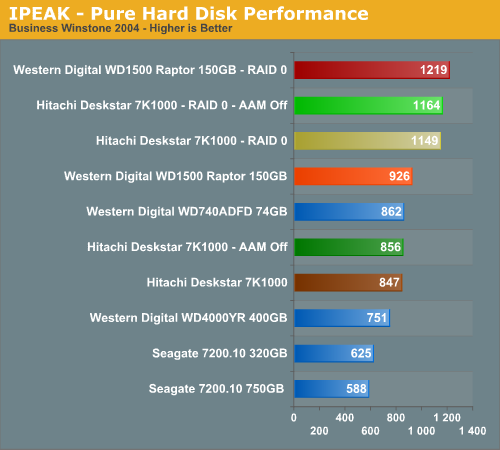
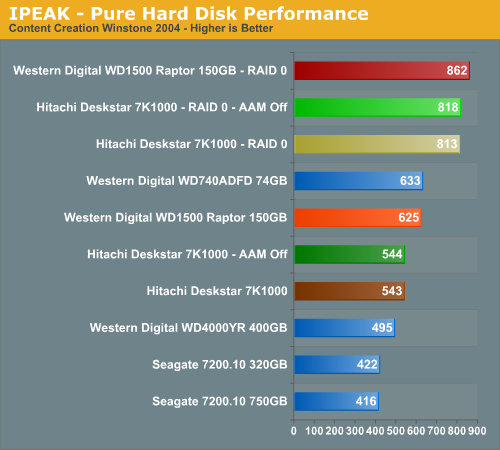
As expected the WD1500 Raptor drives finish at the top in our business application tests as its 10k RPM spindle speed and optimized cache play an important role in its ability to sustain high transfer rates, especially in the Content Creation benchmark where transfer block sizes are significantly larger and more random than in the Business application benchmark. This is true with either a single drive or RAID 0 setup although we see the 7K1000 trailing the WD1500 by less the 5% in these tests. While RAID 0 has the theoretical capability to improve throughput by up to 100% before system overhead, we only see a 31% to 35% improvements in these pure hard disk benchmarks.
iPeak General Task Tests
The iPeak based General Task benchmarks are designed to replicate utility based application tasks that typically are disk intensive and represent common programs utilized on the majority of personal computers. While the WinRAR program is very CPU intensive it will typically stress the storage system in short bursts. Our antivirus benchmark will stress the storage system with continual reads and sporadic write requests while the defragmentation process is split between continual read and write requests.
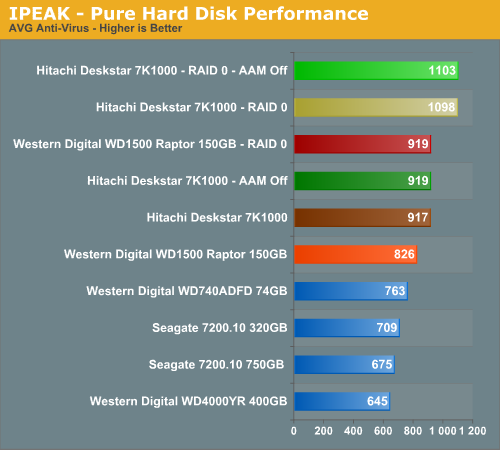
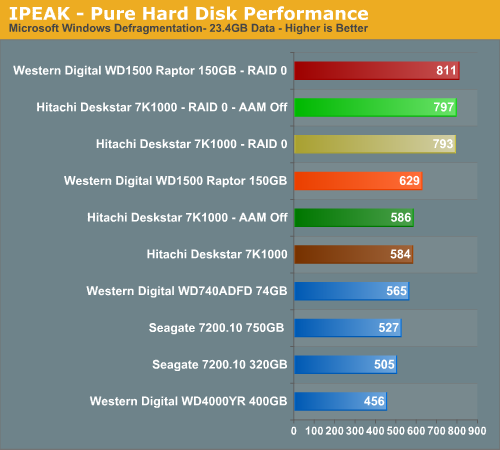
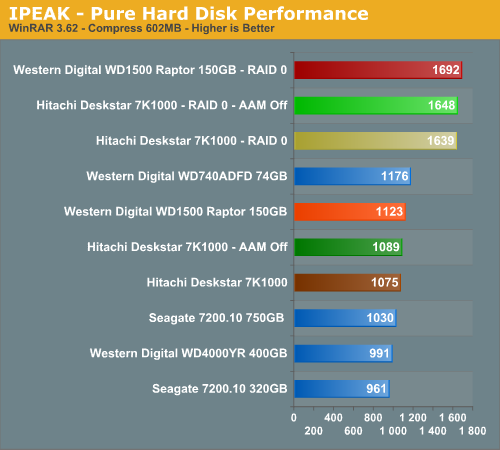
The 7K1000 performs extremely well in the Anti-Virus and Defragmentation test where its 32 MB cache benefits read operations with results that mirror the PCMark 2005 tests. This holds true with the RAID 0 configuration although we only see a 20% improvement in the AVG test results. Also of interest is that in the AVG test we see the Raptor RAID 0 setup score the same as the single drive 7K1000 configuration.
The Raptor holds a small advantage in the Windows defragmentation test in both the RAID 0 and single drive results. The rotational speed of the Raptors just cannot be beat in this test, but the 7K1000s score extremely well due to their cache size.
This is especially true in the WinRAR tests where the rotational and access speeds of the Raptors outperformed the 7K1000 setups in both configurations. In this test, write speeds are very important and we see the RAID 0 setups scoring around 50% better, though we expected better performance based upon the PCMark05 results. However, keep these pure performance results in mind as they will not be repeated in our actual WinRAR tests.
Our iPeak Winstone benchmarks offer a glimpse into how well our hard disk drives will handle general office applications, media encoding, and graphics manipulation. While the business applications that are being tested tend to be more CPU bound at times, the performance of the hard drive can and will make a difference in the more disk intensive video and graphics applications where large media files are typically being edited.


As expected the WD1500 Raptor drives finish at the top in our business application tests as its 10k RPM spindle speed and optimized cache play an important role in its ability to sustain high transfer rates, especially in the Content Creation benchmark where transfer block sizes are significantly larger and more random than in the Business application benchmark. This is true with either a single drive or RAID 0 setup although we see the 7K1000 trailing the WD1500 by less the 5% in these tests. While RAID 0 has the theoretical capability to improve throughput by up to 100% before system overhead, we only see a 31% to 35% improvements in these pure hard disk benchmarks.
iPeak General Task Tests
The iPeak based General Task benchmarks are designed to replicate utility based application tasks that typically are disk intensive and represent common programs utilized on the majority of personal computers. While the WinRAR program is very CPU intensive it will typically stress the storage system in short bursts. Our antivirus benchmark will stress the storage system with continual reads and sporadic write requests while the defragmentation process is split between continual read and write requests.



The 7K1000 performs extremely well in the Anti-Virus and Defragmentation test where its 32 MB cache benefits read operations with results that mirror the PCMark 2005 tests. This holds true with the RAID 0 configuration although we only see a 20% improvement in the AVG test results. Also of interest is that in the AVG test we see the Raptor RAID 0 setup score the same as the single drive 7K1000 configuration.
The Raptor holds a small advantage in the Windows defragmentation test in both the RAID 0 and single drive results. The rotational speed of the Raptors just cannot be beat in this test, but the 7K1000s score extremely well due to their cache size.
This is especially true in the WinRAR tests where the rotational and access speeds of the Raptors outperformed the 7K1000 setups in both configurations. In this test, write speeds are very important and we see the RAID 0 setups scoring around 50% better, though we expected better performance based upon the PCMark05 results. However, keep these pure performance results in mind as they will not be repeated in our actual WinRAR tests.










48 Comments
View All Comments
Gaelstorm - Wednesday, October 8, 2008 - link
This article was a long time ago, but the second to last comment before mine was talking about fair. If a program is not hard drive intensive and is just slow all around like the Sim 2, you are not being fair by mentioning that Raid 0 doesn't help it. Honestly nothing will help with that games load time except a faster computer overall. Even so that game loads horrible for the type of game it is. I can tell you right now, there are very few situations I have encountered where Raid 0 didn't way outperform a single drive for gaming or just feel on a desktop type system. All the arguing I read, actually made me rethink trusting information from certain sources at all.Per Hansson - Tuesday, April 24, 2007 - link
Some ideas, as could be seen on page 4 of the review the system was limited by something (flat graph in STR instead of what you would expect)This is probably because you are using the normal SCSI Miniport driver, which happens to be the only choice for Win2K and WinXP 32 bit
WinXP 64bit, 2003 Server 32bit and 64 bit and Vista 32 bit and 64 bit has the new StorPort miniport driver, which improves performance tremendeously in RAID arrays
Of course the controller cards driver must also actually support and use the StorPort driver instead of the normal SCSI miniport driver
What this means in laymens terms is that it was not because the "software based" RAID controllers where crap that we got shitty performance in Win2K and XP, it was because those controllers had shitty drivers. Which really was MS fault.
The really expensive RAID controllers however did not use the NT4/2000 Server etc native SCSI miniport driver but had their very own implementation (just as good as MS "all new" storport driver) which meant that they where not capped at about 100-150MB/sec, but rather unlimited... Try your review with 4 150GB Raptors in RAID-0, your performance will be the same because it is the drivers that is holding the system back...
Please keep this in mind for your upcoming review ;)
http://download.microsoft.com/download/5/6/6/5664b...">http://download.microsoft.com/download/...06-45ec-...
ShadowdogKGB - Saturday, April 21, 2007 - link
You have 5 synthetics that tell us that two are faster in stripe but then you have 5 real world tests that aren't real world at all. Tell me who plays HL2 Lost Coast and Sims2 Neighborhood. I think you should just stop testing raid setups all together since you can't be honest about it.Gary Key - Sunday, April 22, 2007 - link
The Sims2 continues to be one of the top selling/played games in the world and HL2 along with its various versions is also a top played title. We are revising our benchmark suite to include WoW and a couple of other titles that were recently released. As far as the other benchmarks, compression/decompression and encoding are fairly common activities on a PC the last time I checked. ;-) What are we not being honest about?
jleboeuf - Saturday, April 21, 2007 - link
I'd be interested to see what your results fair out w/ a raid 10 config w/ 6 drives. that's 3 terabytes, and completely mirroredaethyrmaster - Friday, April 20, 2007 - link
They said they only used a 64 kB (KiB if you prefer) stripe size. Using stripes of 128 kB size would most likely have changed the results significantly. If possible, I'd like to see results with a 256 kB stripe as well.Separately, I personally have used RAID 0, as well as used exactly the same drives in a non-RAID setup. I often times do a lot of transferring of video from my PC to other devices on a Gigabit ethernet network, and the extra 10 to 30 MB/sec transfer rate provided by RAID 0 is well appreciated when you are copying 400 to 800 MB (MiB) of video.
GOSHARKS - Friday, April 20, 2007 - link
Is that even statiscally significant? As it is, it can be slightly misleading.
Gary Key - Sunday, April 22, 2007 - link
Not in the grand scheme of things but the tests were run five different times with the same results. We were providing information based upon having a retail drive to test instead of the OEM drive we had in the first article. There were a few comments that suggested differences could have existed between the two so we tried to answer it.
tshen83 - Thursday, April 19, 2007 - link
reviewing a 1TB drive by raid 0? the writer obviously have NO FREAKING IDEA of what the target audience is. A RAID5 review would be much more appropriate. Hate to lose 100GB of data nowadays...let alone 2TB, at that point, you might as well kill yourselfGary Key - Thursday, April 19, 2007 - link
We have a full RAID article in the works that will test RAID 1, RAID 1+0, and RAID 5 with several drives, Intel and NV chipsets, along with hardware controllers. As I mentioned in the article, this story will be up in the coming weeks. As far as offering RAID 0 results with a motherboard controller chipset, this was done as the vast majority of boutique systems offer this option along with several hundred emails asking when we could provide RAID 0 results with the latest drive releases.